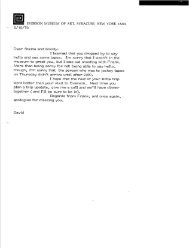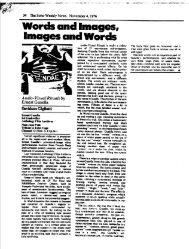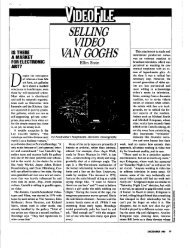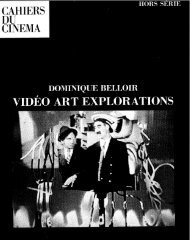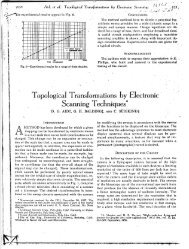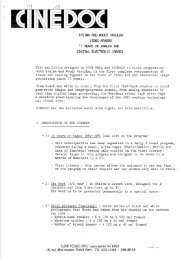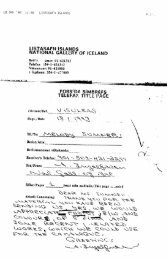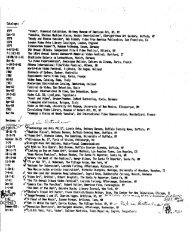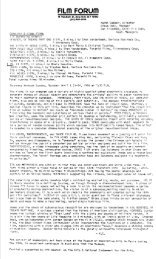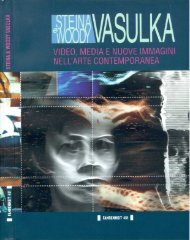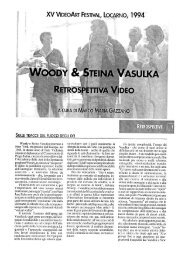MEDIA STUDY/BUFFALO - the Vasulkas
MEDIA STUDY/BUFFALO - the Vasulkas
MEDIA STUDY/BUFFALO - the Vasulkas
You also want an ePaper? Increase the reach of your titles
YUMPU automatically turns print PDFs into web optimized ePapers that Google loves.
journey Across Three Continents<br />
Media Study/Buffalo, in association with Third World Newsreel, is presenting selections<br />
from Third World Newsreel's 5th Annual Film Festival . Curated by film historian<br />
and Festival Director Pearl Bowser, Journey Across Three Continents represents<br />
twenty years' of cinema from Africa and <strong>the</strong> Black Diaspora . The major focus of<br />
<strong>the</strong> program is on work from West Africa-where African cinema has its<br />
birthplace-and <strong>the</strong> African presence reflected in <strong>the</strong> work of Black American filmmakers<br />
.<br />
This major series is <strong>the</strong> first film retrospective of its kind presented in <strong>the</strong> United<br />
States . Journey Across Three Continents was originally presented in <strong>the</strong> fall of 1983<br />
Festival Poster designed by Christine Choy, 1984.<br />
February 2 (Thursday)<br />
8:00 PM<br />
207 Delaware Avenue<br />
FESTIVAL PROGRAM I<br />
Poko (Upper Volta, 1981)<br />
By Idrissa Ouedraogo. 16mm . Black<br />
and White . 20 minutes .<br />
A short narrative about an expectant<br />
mo<strong>the</strong>r and <strong>the</strong> difficulties of childbearing<br />
in a remote village without a<br />
well or medical facilities for emergency<br />
care .<br />
Your Children Come Back To You<br />
(USA, 1978)<br />
By Alile Sharon Larkin . 16mm . Color.<br />
32 minutes.<br />
Your Children Come Back to You is a<br />
contemporary allegory about <strong>the</strong> clash<br />
of African and western values for a<br />
young Black American . Tovi is a little<br />
girl living in <strong>the</strong> United States whose<br />
inner world is divided between her Aunt<br />
Chris, who represents assimilation to<br />
European values, and her parents, who<br />
represent Pan-Africanism and traditional<br />
African values. Chris believes she<br />
must rescue Tovi from a world of welfare,<br />
winos, make-believe beggars, and<br />
Pan-African fairy tales . However, out of<br />
a personal loss, Tovi ultimately rejects<br />
Chris's western values and looks<br />
towards Africa in hope of a new and<br />
better world .<br />
Alile Sharon Larkin is a visual artist<br />
whose interests in creative writing and<br />
<strong>the</strong> visual arts led her to filmmaking .<br />
She studied Creative Writing at USC<br />
and received an MFA in filmmaking at<br />
UCLA . Her second film, A Different Image,<br />
recently appeared on Independent<br />
Focus and at <strong>the</strong> Women's<br />
International Film Festival in New York .<br />
Larkin is currently working on two film<br />
projects: The Kitchen and Abena's<br />
Window.<br />
First World Festival of Negro Art<br />
(USA, 1966)<br />
By William Greaves . 16mm . Sepia . 40<br />
minutes .<br />
Greaves's 1966 documentary is a lively<br />
record of <strong>the</strong> First World Festival of<br />
Negro Art, which took place in Dakar,<br />
Senegal, in that year. Originally conceived<br />
as a newsreel, Greaves expanded<br />
<strong>the</strong> project to produce a<br />
documentary film of <strong>the</strong> major cultural<br />
event . Two thousand Black artists from<br />
all over <strong>the</strong> world congregated in Dakar<br />
to celebrate <strong>the</strong>ir heritage and culture<br />
as Greaves and his tiny crew-a<br />
cameraman and driver-turned-sound<br />
recordist-fol[owed such legends as<br />
Duke Ellington, Alvin Ailey, Langston<br />
Hughes, and Marpessa Dawn, <strong>the</strong> star<br />
of Black Orpheus.<br />
by Third World Newsreel in cooperation with <strong>the</strong> Metropolitan Museum of Art and<br />
<strong>the</strong> American Museum of Natural History, with additional programs at <strong>the</strong> Ausar<br />
Auset Society of Brooklyn . The Festival was partially funded by <strong>the</strong> New York State<br />
Council on <strong>the</strong> Arts, <strong>the</strong> National Endowment for <strong>the</strong> Arts, and with support from<br />
<strong>the</strong> Film News Now Foundation .<br />
Pearl Bowser will be present both evenings to introduce <strong>the</strong> films.<br />
Admission : $2.00 ; $1 .50 for students and senior citizens ; 500 for children .<br />
A scene from Blacks Britannica by David Koff and Musindo Mwinyipembe .<br />
William Greaves is <strong>the</strong> producer of<br />
over two hundred documentary films<br />
which have won a total of sixty international<br />
film festival awards. He has<br />
produced, written and directed two feature<br />
films, The Marijuana Affair and<br />
Symbiopsychotaxiplasm : Take One,<br />
and was <strong>the</strong> Executive Producer of<br />
Universal Pictures' Bustin' Loose starring<br />
Richard Pryor and Cicely Tyson .<br />
He recently produced and directed <strong>the</strong><br />
production Tribute to Paul Robeson at<br />
Carnegie Hall for <strong>the</strong> Paul Robeson Archives<br />
. In 1980, Greaves was inducted<br />
into <strong>the</strong> Black Filmmakers Hall of<br />
Fame. He has also received an Emmy<br />
as <strong>the</strong> Executive Producer and Co-host<br />
of Black Journal and won 22 international<br />
awards for <strong>the</strong> documentary<br />
From These Roots.<br />
February 3 (Friday)<br />
8:00 PM<br />
207 Delaware Avenue<br />
FESTIVAL PROGRAM II<br />
Tauw (Senegal, 1970)<br />
By Ousmane Sembene . Color. 27<br />
minutes . In Wolof, with English subtitles<br />
.<br />
Tauw focuses on two,subjects : <strong>the</strong> personal<br />
and societal problems caused by<br />
Senegal's high rate of unemployment<br />
and <strong>the</strong> generational clash, in which<br />
<strong>the</strong> old still cling to Islam, polygamy,<br />
and paternal dictatorship, while <strong>the</strong><br />
young listen to rock, steal without guilt,<br />
and grapple with growing up in a rapidly<br />
shifting society. Ousmane Sembene<br />
tells <strong>the</strong>'simple story of a young man<br />
in search of a job in Dakar ; in <strong>the</strong><br />
course of this quest we witness <strong>the</strong><br />
decomposition of an ancient society.<br />
Ousmane Sembene is a leading African<br />
director. Self-taught, he learned to<br />
write by himself while working as a<br />
stevedore in Marseilles and went on to<br />
become an outstanding novelist and<br />
short story writer whose works have<br />
won many prizes in Europe . He began<br />
studying filmmaking when he was past<br />
forty, as an apprentice to renowned<br />
Russian director Mark Donskoi, and<br />
has gone on to make a number of internationally<br />
acclaimed works, including<br />
Black Girl (1965), Xala (1974) and<br />
Ceddo (1977) .<br />
Blacks Brittanica (USA, 1978)<br />
By David Koff and Musindo Mwinyipembe.<br />
16mm . Color. 60 minutes.<br />
"A relentless, hard-hitting exposure of<br />
<strong>the</strong> racial and economic oppression of<br />
Britain's black population, toge<strong>the</strong>r<br />
with <strong>the</strong>ir militant resistance . . ."<br />
- Clyde Taylor,<br />
Black Collegian<br />
27



